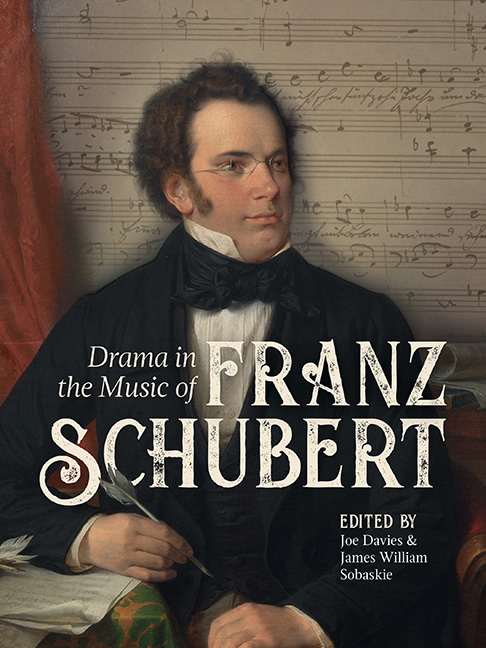Book contents
- Frontmatter
- Dedication
- Contents
- List of Figures
- List of Tables
- List of Contributors
- Acknowledgements
- Preface
- Introduction: Internal Dramas
- PART I STAGE AND SACRED WORKS
- 1 Opera that Vanished: Goethe, Schubert, and Claudine von Villa Bella
- 2 Pioneering German Musical Drama: Sung and Spoken Word in Schubert's Fierabras
- 3 The Dramatic Monologue of Schubert's Mass in Ab Major
- PART II LIEDER
- PART III INSTRUMENTAL MUSIC
- Select Bibliography
- Index
1 - Opera that Vanished: Goethe, Schubert, and Claudine von Villa Bella
from PART I - STAGE AND SACRED WORKS
Published online by Cambridge University Press: 25 March 2020
- Frontmatter
- Dedication
- Contents
- List of Figures
- List of Tables
- List of Contributors
- Acknowledgements
- Preface
- Introduction: Internal Dramas
- PART I STAGE AND SACRED WORKS
- 1 Opera that Vanished: Goethe, Schubert, and Claudine von Villa Bella
- 2 Pioneering German Musical Drama: Sung and Spoken Word in Schubert's Fierabras
- 3 The Dramatic Monologue of Schubert's Mass in Ab Major
- PART II LIEDER
- PART III INSTRUMENTAL MUSIC
- Select Bibliography
- Index
Summary
For Susan Wollenberg, who reads our work
with a musician's ear and a scholar's mind for argument
Prologue: Reception History of Schubert's Operas
In the first scholarly study of Schubert's operas, written in the 1920s, Rudolfine Krott raised the controversy between the lyrical and the dramatic, which has run as a leitmotif through Schubertian literature. In the absence of a historical performance tradition, the usual solecisms for Schubert's ‘failure on stage’ have been repeated: the lyrical composer who was incapable of writing dramatic music, coupled with the poor quality of his libretti. Beyond the question of Schubert's musical reaction to the libretto and the already-loaded questions of text setting, the general principles of stage dramaturgy, performance practice, and history apply. This criticism moves far beyond the lyrical and the dramatic and is rooted in negative prejudice, Schubert's lack of theatrical experience, fragmentary sources and, until recently, the lack of a proper performance edition.
Only on two occasions was Schubert granted the experience of watching his own operas in performance. He never benefitted from dissension at rehearsals that lead to the kind of solutions worked up in the theatre rather than imagined in the writing of a score. Most successful operatic composers are very well aware of this process. When revising his opera Le prophète, Meyerbeer directly acknowledged ‘the difference between an opera that comes from one's head, and the one that one sees in the theatre’; and when editing multiple versions of a Donizetti opera, Roger Parker acknowledges this practice of constant revision and conceded, ‘The more one becomes aware of this type of activity, the more arbitrary it seems to choose one particular stage of a work to present as its “base text”’. Most of Schubert's operatic scores are ‘base texts’, yet one only has to glance across at the four manuscripts of ‘Erlkonig’ D. 328 to see how willing Schubert was to fine-tune through performance, and how song for him was a fluid rather than a fixed form. Such music of revision is rarely found in Schubert's operatic scores, and this lack of opportunity had a drastic and long-lasting effect on his reception history.
- Type
- Chapter
- Information
- Drama in the Music of Franz Schubert , pp. 11 - 34Publisher: Boydell & BrewerPrint publication year: 2019



